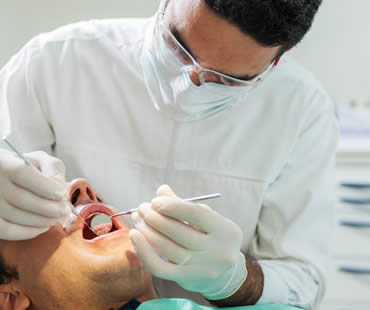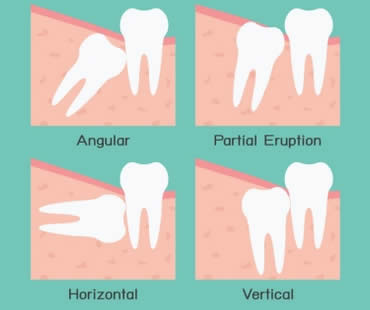
It’s easy to put off a trip to the dentist if you’re not experiencing any pain or noticeable issues. Maybe it’s inconvenient in your busy schedule, maybe you don’t want to spend the money, or maybe you experience anxiety about dental visits. None of these are good enough reasons to forego proper dental care so that you ensure a healthy mouth and attractive smile.
Having regular checkups with your general dentist is important for a variety of reasons. Probably the most beneficial reason is to catch problems early, before they have time to become serious and negatively impact your oral health. Cavities and gum disease are both examples of issues that can wreak havoc in your mouth if left untreated, but if handled quickly they may disappear with as little as a fluoride treatment or change in your hygiene routine. Avoiding treatments like fillings, crowns, or root canals – not to mention the associated costs to your wallet and your schedule – are great reasons to see your dentist every six months!
Another benefit of regular checkups is a brighter, more beautiful smile. Even the best dental hygiene at home can’t reach every bit of plaque or tartar that accumulates on your teeth. Professional cleanings eliminate buildup to give you a more appealing smile, as well as removing harmful and stinky bacteria from your mouth.
Your overall health also reaps the rewards of consistent dental care. Oral problems can impact your general health through things like introducing dangerous bacteria into your body that can spread and cause various health risks. Also, your dentist may notice signs of health issues you might not realize, such as cancers or diseases or nutritional deficiencies.
Make your smile a priority and visit your general dentist regularly. Don’t let excuses get in the way of receiving the rewards dentistry has to offer.
We treat patients from Longview and the surrounding area

Wisdom teeth, your third set of molars, are named that because they are the final teeth to erupt. They usually come in between ages 17 to 25, and are located in the very back of your mouth on the top and bottom. Your dentist will examine you to find out if your wisdom teeth are properly positioned and healthy. If they aren’t, your dentist will recommend removal.
How do you know wisdom teeth should be removed?
Some of the signs there is a problem with your wisdom teeth include pain, infection, cysts, gum disease, damage to nearby teeth, and tooth decay. If you experience any of these symptoms, see your dentist for an examination.
What are impacted wisdom teeth?
Sometimes your teeth just don’t have room to grow in properly. They can erupt at angles within your jaw, sometimes even horizontally. If wisdom teeth aren’t able to erupt normally they can become trapped, or impacted, inside your jaw. Symptoms of impacted wisdom teeth are pain, infection, and swelling. When teeth are impacted, they can lead to serious problems. Many dentists want to avoid impacted teeth and therefore remove your wisdom teeth before they erupt or grow too big.
Are there less obvious reasons to remove wisdom teeth?
It’s not always clear when these teeth way in the back of your mouth are causing problems, or might in the future. Many dentists remove them in teens or young adults so they don’t cause problems later, or become too firmly planted in the jaw. Also, sometimes wisdom teeth are removed as part of orthodontic, periodontal, or restorative treatment plans.
What happens if I don’t have them removed?
Some dentists prefer to wait and see what happens with time to your wisdom teeth. Make sure you continue to have these teeth monitored, because the risk of problems doesn’t go away with age. Removing wisdom teeth isn’t always necessary, because if there’s room in your mouth and they come in properly, they work just like any other teeth. The key is to watch them to make sure problems don’t arise in the future.
Dental office for wisdom teeth removal

Also called third molars, wisdom teeth are the last set of teeth to erupt. Usually, people get their wisdom teeth in during their late teens and early 20s. Although some individuals have no trouble with their wisdom teeth, many people end up having these teeth removed because they may become impacted and create dental health issues. Learn more about wisdom teeth with this Q and A:
Do I need to have my wisdom teeth removed?
If your wisdom teeth aren’t causing problems, you can leave them alone. Typically, wisdom teeth are crooked or impacted, which can generate problems with the surrounding teeth. Also, wisdom teeth can be harder to keep clean, so the risk of decay on these teeth is higher.
When should I have these teeth taken out?
For optimal results, most dentists recommend wisdom teeth removal for patients when they are between 16 and 22 years old. The formation of the roots isn’t complete, so you have fewer complications.
Are there any risks?
As with any surgery, you can have issues arise, but the biggest concerns are nerve damage and dry sockets. Older patients have a greater chance of nerve damage because the root has more fully developed. Dry sockets occur when the post-surgery blood clots dislodge.
Does my age matter?
Some adults don’t experience any symptoms until they are in their 30s, 40s, or 50s. You can have these teeth extracted at any point, but when you get older, surgery is more difficult and the recovery takes longer. If you have trouble with your wisdom teeth, contact your dentist right away for a complete exam.
Longview dental office for wisdom teeth – Scott Distefano, DDS

Severely damaged, injured or diseased teeth can lead to not only cosmetic problems with your smile, but also functional ones. Your dentist may recommend dental crowns or dental bridges to treat your dental issues.
Dental crowns are a restorative dental therapy that covers the affected tooth completely, serving as the new outer surface of the tooth. A dental crown maintains the natural roots of a tooth and can prevent extraction. A dental bridge fills the gap left by one or more missing teeth and is affixed to bordering teeth with an anchoring crown.
Both dental crowns and dental bridges are made from a variety of materials that can be designed to match the color of your surrounding natural teeth. As opposed to removable prosthodontics such as full or partial dentures, dental crowns and bridges are permanently bonded to existing teeth or dental implants, allowing them to function and appear as natural teeth.
Dental crowns and bridges have a number of advantages and benefits, such as:
- Dental crowns protect the natural tooth after a root canal therapy, helping to prevent bacteria re-infecting the tooth that could lead to extraction.
- Dental bridges restore gapped or missing teeth, providing support to the surrounding teeth, preventing them from shifting in to fill the empty space and affecting your speech, bite and smile.
- Your dentist can typically place dental crowns and bridges in as few as two appointments.
- Dental crowns and bridges are both long-lasting, durable therapies, designed to protect your natural tooth for years to come.
- Dental crowns prevent bone loss by preserving the natural tooth roots, thereby stimulating the jawbone, preventing resorption, or shrinkage, of the bone following extraction.
If you have questions about what a dental crown or bridge can do to improve the form and function of your smile, talk to your dental professional today. You can restore your healthy smile and preserve it for years to come with a dental crown or dental bridge treatment.
Our dental office is located in Longview

Many oral surgeries go beyond simply removing a tooth, and the cause is not always related to poor dental hygiene. Some reasons for oral surgery just can’t be predicted or avoided, such as injuries, birth defects, or cancer. Great strides have been made in oral surgery, especially for restoration and reconstruction techniques. These are some common reasons that oral surgery is advised.
Tooth loss
Replacing missing teeth with dental implants requires oral surgery so that the titanium implant can be inserted into the jaw. Providing an alternative to dentures and bridges, implants offer a secure and permanent solution that looks very natural. Candidates with adequate bone density, good overall health, and who practice proper oral hygiene are considered for implant surgery. After the implant heals, a crown will be placed on top to complete the restoration.
Impacted teeth
One of the most common oral surgeries is to remove impacted wisdom teeth. Often occurring during the late teen to early adult years, wisdom teeth are unable to erupt properly and must be extracted to prevent future problems.
TMJ
Temporomandibular joint disorders involve the joint where the skull and lower jaw come together in front of the ear. Facial pain, headaches, popping, and jaw problems can result, and dentists try to treat the disorder with solutions like splints, physical therapy, and medications. Severe cases can require surgery to fully correct the TMJ problems.
Injuries
Car accidents, sports injuries, and other trauma can cause broken facial bones or jaws. Surgery may be necessary to realign the jaws, wire bones together, and otherwise repair the injury so that normal function and comfort can be restored.
Cleft repairs
Birth defects like a cleft lip or palate are corrected through oral surgery. Usually a series of surgeries over a span of years is needed to improve the appearance and proper function of the areas affected by the birth defect.
Biopsy
Surgery is performed to remove cancerous tumors or lesions in the jaws or facial bones. This is especially true when the joints or connecting muscles and tendons are involved.

Restorative dentistry has made incredible advancements in the technology of restorative dental materials, and there are more options than ever today for your dental crown or dental bridge. Zirconium and porcelain have proven to provide lasting strength and durability, exhibiting the most natural cosmetic dental restorations available today. Each tooth in each mouth is different, however, and in some cases, resin composite or metal alloy might be the choice recommended for you.
Metals are a common choice for dental crowns and dental bridges. Gold or palladium alloys, as well as chromium or nickel (base-metal) alloys can be excellent choices. Metal alloy crowns show the least “wear down” over years of use. They almost never chip, break or wear down opposing teeth. The primary complaint about metal alloy materials is that their color is metallic and thereby unnatural. They will not blend with the surrounding teeth, and as such, they are chosen more for back molars where they won’t draw attention.
Dental composite/resin materials are a popular choice that can be made to blend with the surrounding teeth, but they’ve been shown to wear down over time and are more prone to fractures and breaking than other materials.
Porcelain can be fused to metal to form a natural-appearing crown or bridge, and because of their appearance, are a good choice for front or back teeth. Over time, however, discoloration can appear along the gum line as the porcelain wears away, leaving a dark, unsightly line. The porcelain can be fused to zirconium, however, which eliminates the dark line and is a good cosmetic choice for front teeth.
Crowns and bridges can also be made from all-porcelain or all-ceramic materials. These materials are the best choice for natural-looking teeth of the types of dental crown and dental bridge materials available in restorative dentistry today. Because they contain no metal, they are excellent choices for patients with metal allergies. They tend to be weaker and less durable than materials containing metals, however.
Talk to your cosmetic dentist today with any questions you have regarding what type of dental crown or bridge material is best for your smile needs.
Our dental office is located in Longview









